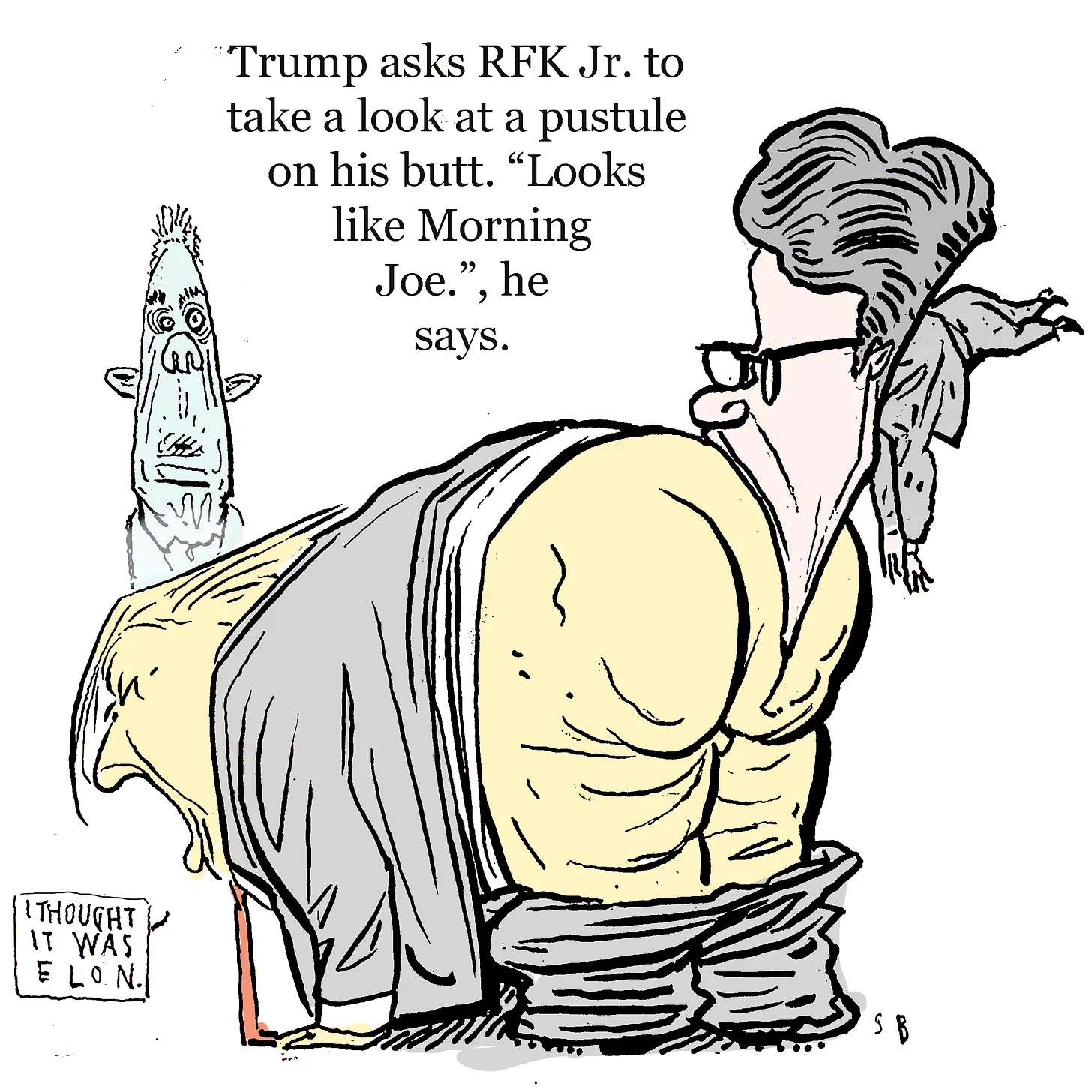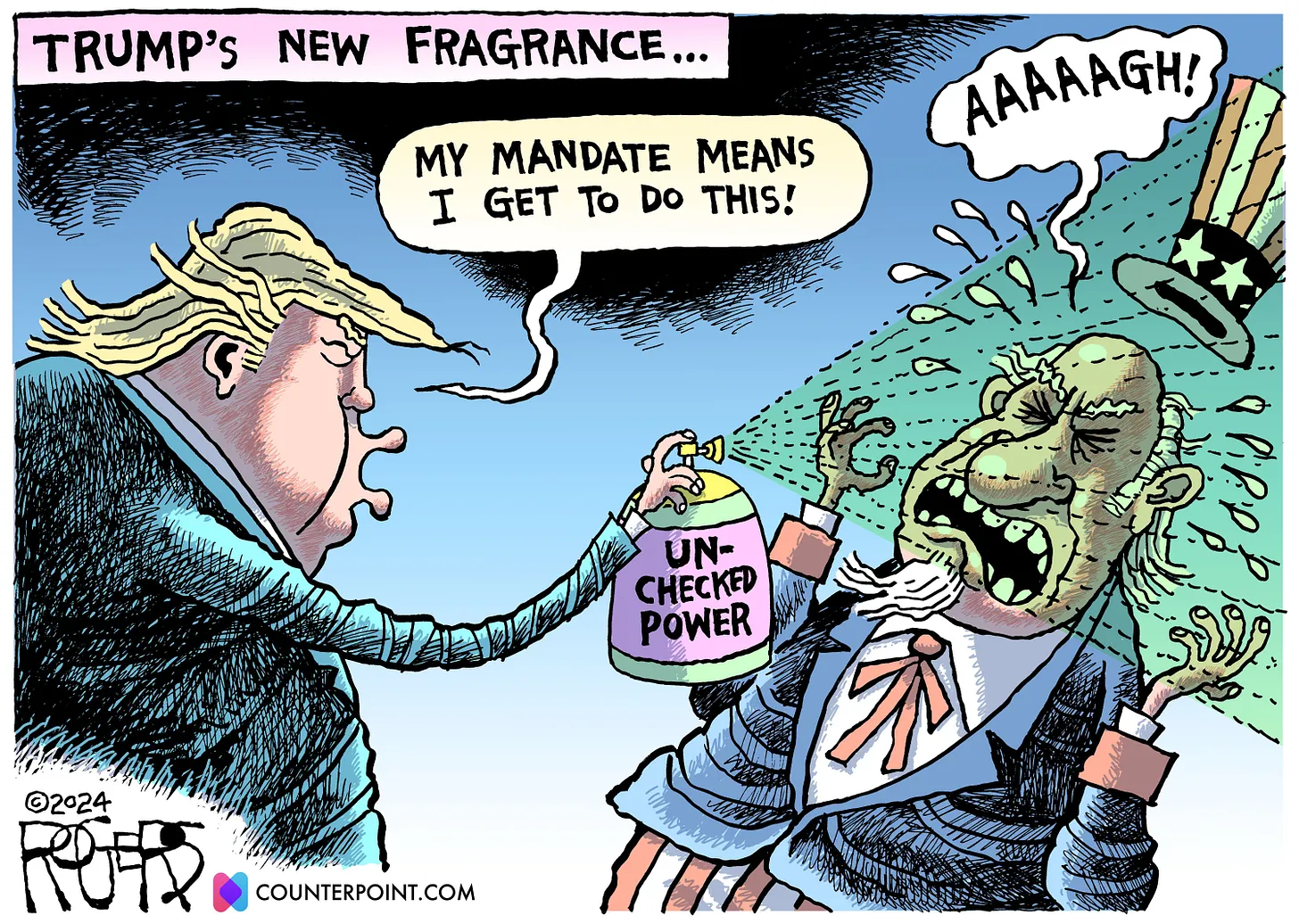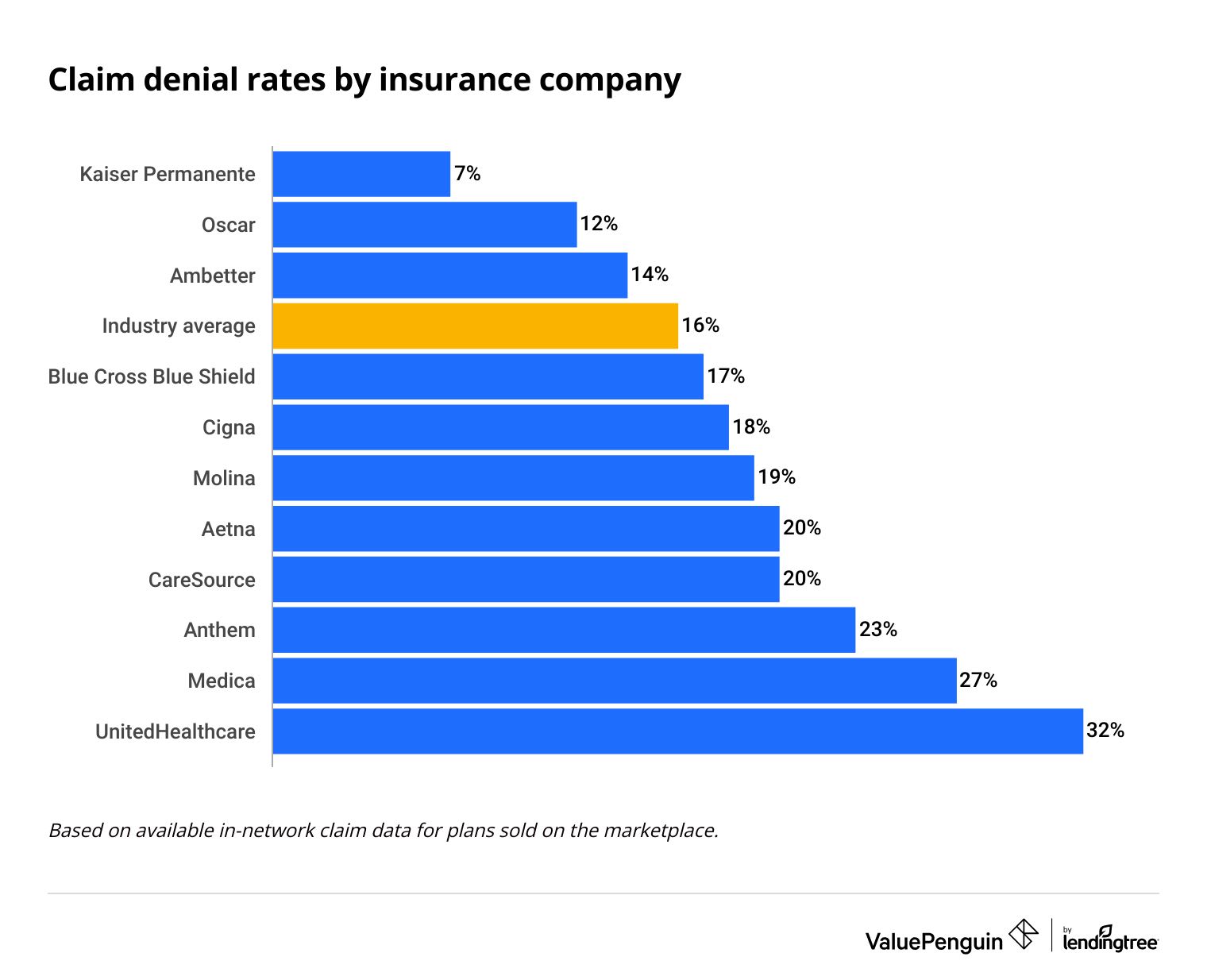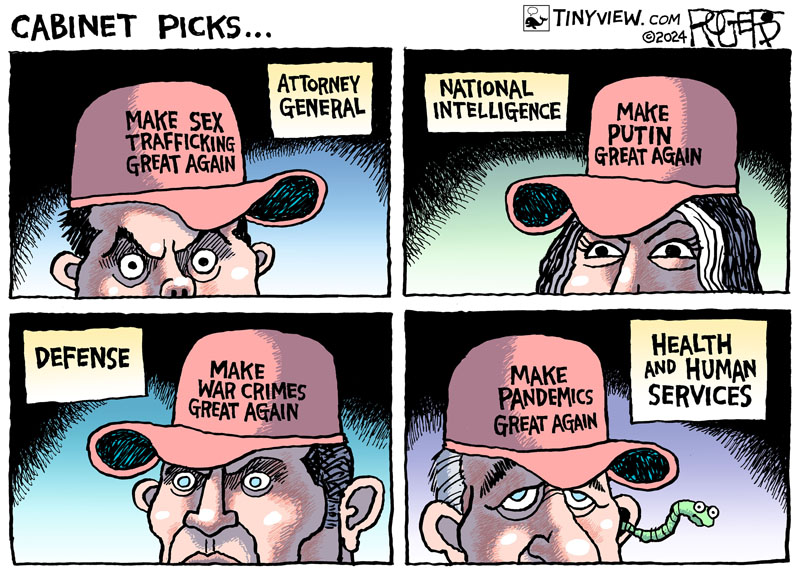When Elon tweets something and when Trump tweets something,
Republicans don't know who their Daddy is.
- Rep. Alexandria Ocasio-Cortez
This week's featured post is "Cracks in the MAGA Coalition".
This week everybody was talking about Jimmy Carter

President Jimmy Carter died Sunday at the age of 100, after 22 months in hospice care.
Carter was president from 1977 to 1981. His single term was marred by high inflation and the Iranian hostage crisis, but looks much better in retrospect than it did at the time. I find myself pining for the roads not taken. Carter created possibilities which his successors did not pursue, and the world is worse for America's failure to follow his lead.
Carter was the first president to recognize global warming as a problem. He installed solar panels on the White House roof (which his successor, Ronald Reagan, promptly removed). While the country did not take the path to sustainable energy he envisioned, much of the sustainable energy used today is based on research funded under his presidency. Rolling Stone makes the case that he was America's Greatest Environmental President.
In 1978, he brought Egyptian President Anwar Sadat and Israeli Prime Minister Menachem Begin together to negotiate the Camp David Accords. The two countries have not fought a war since, and for a time, peace in the Middle East seemed possible.
Today, Carter is best known for his post-presidency. He ran for president in 1976 as a born-again Christian, and his subsequent life exemplified the Christ-like values so often lacking in Evangelical leaders. He and his wife Rosalynn (who died in 2023 after 77 years of marriage) championed Habitat for Humanity, and into their 90s were still swinging hammers to build houses for the poor. The Carter Center has been a voice for peace, democracy, and human rights for more than 40 years.
After his presidency, he returned to his farm in Plains, Georgia. He regularly taught Sunday school classes at his church. (My sister recently posted a picture she and her husband took with the Carters after attending his class in 2015.)
His death should remind us all of an era when we expected our leaders to be virtuous people -- and occasionally they even were.

Jay Kuo posted a charming memory about meeting Rosalynn Carter when he was a child.
and US expansion

Recently Trump has tweeted about a variety of possible "territorial expansions" of the US -- conquests, really, because there's no sign any of these folks want to be part of the MAGA empire.
Greenland. On December 22nd, Trump released a statement that "For purposes of National Security and Freedom throughout the World, the United States of America feels that the ownership and control of Greenland is an absolute necessity." Apparently, having Greenland continue as a territory of our NATO ally Denmark is not good enough.
And you'll never guess why we have to take over Greenland: global warming. Here's former Trump national security adviser Robert O'Brien on Fox News:
It’s strategically very important to the Arctic which is going to be the critical battleground of the future because as the climate gets warmer, the Arctic is going to be a pathway that maybe cuts down on the usage of the Panama Canal.
So climate change is a hoax when we're talking about limiting the burning of fossil fuels, but it's absolutely real when it justifies taking territory from our NATO allies or ruling indigenous peoples against their will.
Panama Canal. On Christmas, Trump charged that Chinese soldiers are operating in the Canal Zone illegally. (A Hong Kong based corporation has the contract to manage two ports near the Canal's entrances. That's the closest anyone has come to making sense out of Trump's ridiculous claim.) He suggested that the spirit of the agreement through which the US returned the Zone to Panama in 1999 has been violated, and said he was going to demand it back.
James Fallows (who during the Carter administration was involved in formalizing the treaties that returned the Canal to Panama) covers all this in much more detail. The push to return the Canal to Panama, he says, originally came from the military, which doubted its ability to defend the Canal if the local population viewed it as an enemy occupation. (If you're worried about Chinese influence now, imagine if they could arm an indigenous uprising.) That's why he estimates the chances of the US actually retaking the Canal by force as "zero".
The issues Trump raises about Chinese soldiers and discriminatory pricing are complete fantasies.
Fallows also points out that the Canal is a climate-change issue: Operating the locks requires water, and depends on rainfall in the local watershed. Lately that rainfall has been declining.
Canada. This is almost certainly trolling on Trump's part. In his Christmas message he tried to appeal to Canada's citizens: If they became "the 51st state", he claimed, their taxes would go down and they'd reap all kinds of benefits. (Of course they'd also lose their health coverage, and their life expectancy would probably drop 3 1/4 years to match ours.)
I find myself unmoved by these visions, which I suspect are entirely vaporous. (In other words, I don't expect to see US aircraft carriers move to menace Nuuk.) During Trump's first term, Rachel Maddow used to say, "Watch what they do, not what they say", implying that Trump might be doing something behind the scenes that contradicted his public rhetoric. The same thing applies here, but in reverse: He's saying things that will excite his base and inflame his critics, but I suspect no action will result. So I refuse to be inflamed.
Liberals often suggest that Trump's outlandish rhetoric is supposed to distract us from something else he's doing. But here I think his own supporters are the target, and they're supposed to overlook what he isn't doing. Trump is not going to cut trillions from the federal budget, he's not going to lower the price of eggs or gas, and if you're not rich you won't notice whatever tax cut you get. But if he can get his supporters excited about Greenland and Panama, they may not notice the bankruptcy of his other promises.
Fallows has this right: The point of Trump's rhetoric is to stoke his followers' sense of grievance.
and Matt Gaetz

Just as I was getting ready to post last week, the House Ethics Committee released its report on Matt Gaetz.
In sum, the Committee found substantial evidence of the following:
- From at least 2017 to 2020, Representative Gaetz regularly paid women for
engaging in sexual activity with him. - In 2017, Representative Gaetz engaged in sexual activity with a 17-year-old girl.
- During the period 2017 to 2019, Representative Gaetz used or possessed illegal drugs, including cocaine and ecstasy, on multiple occasions.
- Representative Gaetz accepted gifts, including transportation and lodging in
connection with a 2018 trip to the Bahamas, in excess of permissible amounts. - In 2018, Representative Gaetz arranged for his Chief of Staff to assist a woman with whom he engaged in sexual activity in obtaining a passport, falsely indicating to the U.S. Department of State that she was a constituent.
- Representative Gaetz knowingly and willfully sought to impede and obstruct the Committee’s investigation of his conduct.
- Representative Gaetz has acted in a manner that reflects discreditably upon the House. Based on the above, the Committee concluded there was substantial evidence that Representative Gaetz violated House Rules, state and federal laws, and other standards of conduct prohibiting prostitution, statutory rape, illicit drug use, acceptance of impermissible gifts, the provision of special favors and privileges, and obstruction of Congress
The 42-page report outlines that "substantial evidence". Gaetz' protest is that the Justice Department also investigated him and did not press charges, which he (falsely) claims "exonerates" him.
Reading the report, you can see how many of the witnesses might not be credible in court, where a beyond-reasonable-doubt standard would apply to any criminal charges. In court, Gaetz' refusal to answer questions or explain his actions would not count against him.
However, the evidence in the report is quite persuasive if the question is "Should this man be in Congress?" or "Should this man be Attorney General?". I find it striking that the dissenting opinion at the end of the report says "While we do not challenge the Committee’s findings ..." and only protests that the report should not have been released after Gaetz resigned from the House. In short, not even the Republicans on the committee were willing to defend Gaetz' conduct or claim the process had been "weaponized" against him, as Gaetz himself claimed.
and you also might be interested in ...
Whooping cough is on the rise, largely because fewer children are being vaccinated for it. Cases are up five times over last year's totals.
You might naively think that as sea levels rise, they'll rise the same amount everywhere. Apparently this is not true. The US Southeast seems unusually prone to sea-level rise, with an increase of seven inches since 2010 in some places.
Now that the Supreme Court has banned universities from considering race in their admissions process, Black enrollment in elite programs has dropped. Harvard Law School has 19 incoming Black students, down from 43 the previous year.
It makes headlines when police kill some unarmed person of color for no justifiable reason, but such incidents are comparatively rare. More significant, this WaPo article claims, are the less extreme but more-or-less constant abuses dished out to women, the poor, and the homeless.
I remember a similar point being made after the killing of Michael Brown started demonstrations and violence in Ferguson, Missouri in 2014. The national coverage focused on that particular death and the conflicting accounts of what really happened. To the community, though, the killing was just an extreme example of what they saw every day.
SkepChick thinks the case against black plastic utensils has been overblown.
and let's close with something timely
Tomorrow is New Year's Eve, when many of you will be tempted to make resolutions. Resolutions, as we all know, are extraordinarily hard to keep. The ideas always sound great: Who doesn't want to exercise more and read more and learn a new language? But there are reasons you have lived your whole life so far without doing those things, and those reasons don't go away just because you get a new calendar.
So more often than not, making a resolution is just setting yourself up for failure. But there is an alternative: CGP Grey suggests declaring a theme for your year rather than committing to specific goals you will probably not achieve.
So rather than commit to read one book a week, you could declare 2025 the Year of Reading. It's a softer goal, one that will allow you to try, fail, and come back to try again. Or rather than committing to lose 15 pounds, run two miles a day, and become a vegetarian, you might declare a Year of Health. Each day, you might remind yourself that you're trying to be healthier this year. And who knows? Maybe you will be.





















